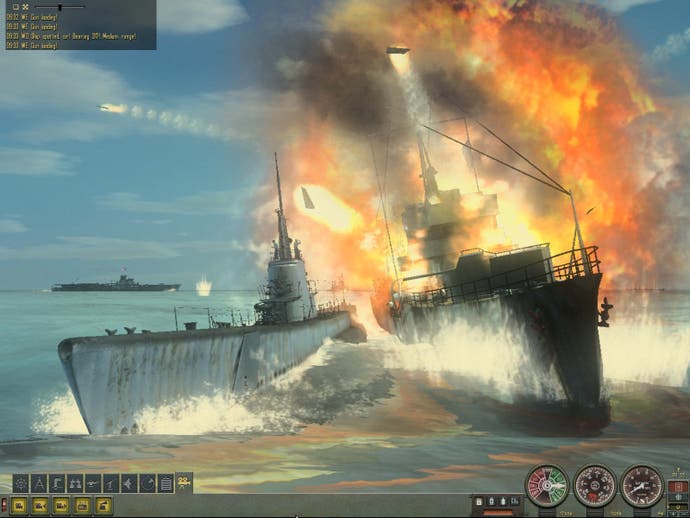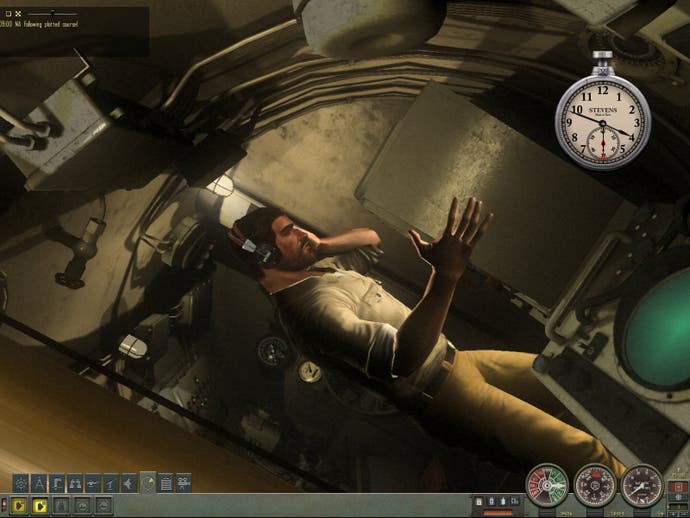Silent Hunter 4: Wolves of the Pacific
Howling gales explained.
Before we start, it's only right I declare a small vested interest in this submarine game. For the record, I was the one that came-up with the 'Wolves of the Pacific' part of the title. Since 2000 I've been helping Ubisoft name all of their simulations. Silent Hunter 2: Mongooses of the Atlantic was one of mine. IL-2: Crocodiles of the Clouds, that was another. Right now it looks like the new Oleg Maddox WW2 flight sim will leave the hangar as Battle of Britain: Sky Voles versus Air Rhinos thanks to me.
But enough bragging. SH4 is gaming's most enduring WW2 sub sim franchise returned to its old spawning grounds, the Pacific Ocean. Where SH2 and SH3 required you to chloroform your conscience, sinking British and American merchant shipping as a dastardly Kriegsmarine U-boat captain, this episode lets you feel good about drowning the defenceless. This time you're cooped-up in a sweaty US sub and your targets are those Pearl Harbour kidney-punchers, the Japanese.
Hitman on the high seas
For those who've never tried a sub game before, they're like stealthy FPSes with limited weapon choice, minimal scenery, huge levels and super-slow bullet-time. Well, kind of. Most of the time you're cruising around 'topside' looking for something to kill. When that something - a lone merchant, convoy or taskforce - presents itself, the ambush excitement begins. You plunge to periscope depth, and plot an intercept course that puts you just ahead of the prey and abeam of it. Once in position - if you're playing with high realism settings - it's all hands/eyes to the periscope; information about target type, speed, and bearing must all be fed into the TDC (Torpedo Data Computer) before the torps can be unleashed. With less-demanding settings, fire preparation can be as simple as locking the unwitting victim in the crosshairs and waiting for the target icon to turn seaweed-green.

Tick-tick-tick-tick-tick... with the tin fish away there's little to do but wait, hope, rub the sweat from your eyes and watch the pin-thin hand of the stopwatch sweep towards the magic red line. If you've done your calculations correctly, positioned your craft well, and not dispensed a dud, then the rusty toiler in the periscope lens will eventually sprout a gratifying fountain of spray or flame. Mess-up and there'll be nothing except silence and a niggling sense of failure and waste (torps are very precious on long patrols). Worst case scenario, the trail of bubbles from the aquatic missile will have been spotted, the freighter will have begun zigzagging, and the convoy shepherds - depth-charge laden corvettes - will be darting in your direction.
If you like the sound of the above account then you're probably going to enjoy SH4. Whether you'd enjoy it more than you'd enjoy its cheaper, more polished predecessor, is another question. Despite graphics improvements, new mission types, and all the vessels and geography that come with the change of setting, there really isn't a lot of distance between the two sims.
Salty tears

As I write this, numerous passionate fans on official and unofficial forums are bewailing an apparent resolution swindle (The game appears to be 'faking' high resolutions by rescaling 1024x768) and a missing anti-aliasing option. Personally I never noticed the res issue until I read about it and haven't found the lack of FSAA all that distracting. Even with the limitations, this has to be the best-looking naval game ever. Stood on the bridge under a big harvest moon watching a smouldering freighter slip beneath the waves, you'd have to be a real curmudgeon not to admire what Ubisoft's artists have achieved. Much higher poly counts on vessels, gaping holes in hulls, animated crews, lifeboats and bobbing wreckage... it all adds up to spectacular sinkings. My biggest visual complaints would be the harshness of the daytime lighting (shadows can be inky black) and the speed with which some of the new clouds move and morph (think Koyaanisqatsi). Minor irritations at worst.
Dangle the camera over the side and there's evidence of headway there too. Sea-beds now come with a sprinkling of weed and rocks (sadly, neither appear to detect collisions or harbour shoals of fish), the brine itself is thick with drifting shreds of algae. Anyone that ticks the super-hardcore 'no exterior views' box in the option menu is really missing out.
Cabin fever

While (almost) everything is peachy outside, inside progress is less obvious. In certain respects the new interiors are actually inferior to their SH3 equivalents. In the last game the atmospheric control room with its crew and gauges was a kind of 3D interface; you clicked on people and things to move to specific screens or give orders. In SH4 there's little of this functionality left. There are fewer modelled cabins too. Not being able to kip on the captain's bunk anymore doesn't make the game any trickier or less realistic, but it does degrade the fantasy.
Thankfully it's not all bad news on the ambience front. Each sub now comes with a radio for news broadcasts and an MP3 gramophone for morale-boosting mood music. Once modders have filled the disappointingly empty folders attached to these devices, audiophile sun-dodgers will be all set. Well, almost. At present there's a crying need for more crew talk - not dirty jokes, or rambling anecdotes about baseball, steaks, and dames, but 'If we go any deeper we'll be crushed for sure!' and 'Should I really be able to see daylight through this bulkhead?' sort of thing. Right now it's far too easy to take damage without noticing it or unwittingly push your fragile craft beyond its capabilities.
Self-employed shark

SH4 like SH3 comes with a selection of single missions stocked with big, convenient, prizes such as cruisers and carriers. These are great for instant gratification, but if you want to experience the game at its immersive, rewarding best, you really have to throw yourself into a campaign. The career mode basically gives you a sub, a crew, and the entire Pacific and lets you get on with it. Every time you leave harbour you'll have some aim - a dynamically assigned patrol zone or objective - but the task is always flexible enough to allow for lots of freelance hunting and foul-ups. Tonnage is still the reason you get up in the morning (the more marine steel you can deliver to Davy Jones' locker, the more famous you'll get and more chances you'll have to upgrade your sub and recruit quality personnel) but SH4 adds new, welcome, distractions in the form of spy insertions, pilot rescues, and recon trips. The photo-gathering sorties tend to be the most exciting of the extra activities requiring you to sneak around in busy enemy ports snapping enemy ships through the periscope.
There's a bevy of other improvements like the overhauled crew management (Days are now split into three watches with crew automatically rotating when the watch changes) and the adversarial multiplay (One captain controls an escorted convoy while others man attacking subs) but none of them are exactly momentous. Without a bold new ingredient like sub vs. sub warfare or playable surface platforms, SH4 doesn't have quite the character or impact it might have had. Ubisoft have given us a gripping, gorgeous, WW2 submarine sim, it's just a bit of a shame its fundamentally so similar to the last gripping, gorgeous, WW2 submarine sim they gave us. Finger-crossed Silent Hunter 5: Meerkats of the Med will be braver.
